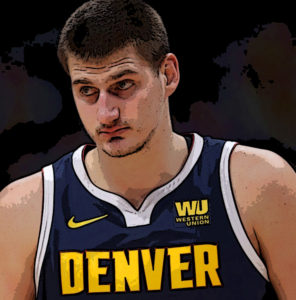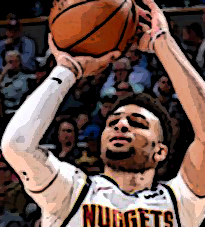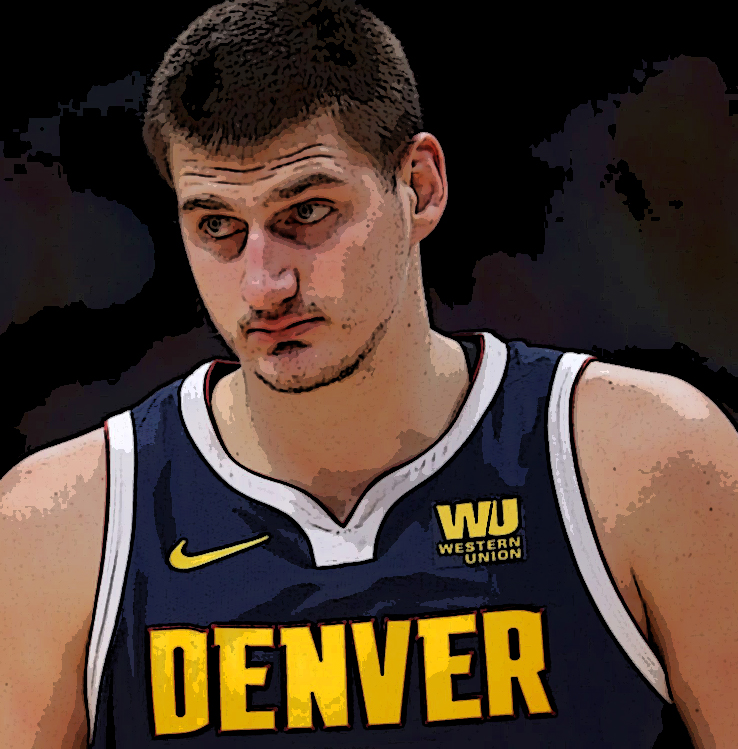#19 IT’S ALL MENTAL: On the Denver Nuggets’ Losing Streak

Nikola Jokic
They may conceivably be pulling out of it, but the Denver Nuggets, our local NBA team, fell into a tailspin, recently dropping five of six games, just as the regular season has started to intensify in its stretch run to the playoffs. In first place in the western conference since December and up 4.5 games on the Memphis Grizzlies, suddenly they made even crappy teams look dazzling.
One of those teams, the San Antonio Spurs, currently 19 wins to 54 losses (consider what it would be like to lose 54 times at something you do for a living), hosted Denver a couple of weeks ago. The Altitude reporter at the game found long-retired Spur’s center David Robinson sitting in the bleachers. Robinson’s play had initiated the great dynastic era of Spurs basketball, himself winning two championships, and succeeded there by Tim Duncan who won five more. “At this time of the season,” Robinson told the reporter, “it’s all mental.”
It’s the psychological dimension of sports that manages to keep them interesting, beyond astonishing athletic feats like one-handed catches in the end zone or electrifying alley oop dunks. Any experienced sports fan has watched as one team dominates the other, making it look miserably inept, and then something shifts, and suddenly you find the dominator getting dominated (for instance, the San Diego Chargers, up 27 to nothing in the first half of a January NFL wild card game with the Jacksonville Jaguars, ended up losing by one point). Often in these situations, the only thing that’s changed is the mind.
Robinson’s bottom-dwelling Spurs (their dynasty now in full collapse) took it to the Nuggets that night and won one of their 19 games. Even good teams play poorly some nights, but the Nuggets had just gotten wiped by the Chicago Bulls like they were the JV team, a performance so putrid, head coach Michael Malone says, it still keeps him awake at nights. Rather than bouncing back from getting their asses kicked, they promptly dropped one to a significantly worse team, and so their losing streak began.
You can point to lots of factors that might figure in, like injuries to star players, but all their terrific starting players are healthy. Instead, literally, they’ve looked like they’ve forgotten how to play. Particularly, they’ve forgotten how to play defense. In the next game against the Nets, they gave up 37 in the 3rd, but at least put in a showing, losing by two. Two days later they brought a largely imaginary defense to the first quarter against the Raptors, who laid 49 points on them in 12 minutes, something they never recovered from.
It’s a long, long season, and can you approach game 63 like it’s life and death? Are they just plain tired? And yet, the other teams who’ve played just as many games don’t look it. No, you’ve got to think it’s mental fatigue. I can’t get my body in front of that guy to keep him out of the paint. He wants to get there more than I want to stop him. Maybe I can’t even reach the point of thinking about getting in front of him. He’s already past me anyway.
Nikola Jokic, two-time MVP in the running for a third in a row, commented in his understated way, “We cannot defend really well right now.”
But it’s offense that’s their forte. They’ve been in and out of no. 1 in the league in three point shooting, for one. We’ve been watching them clank those threes now for weeks. Jokic: “We are forcing [shots] and not getting the extra pass. Even when we are getting the extra pass, we are not making shots. So, I think that’s it.” In the pro sports realm, where everything gets analyzed to death, there you have it.
When proficient shooters like Kentavious Caldwell-Pope and Jamal Murray have gotten open, they’ve struggled to put their shots in. That to me is the most fascinating thing here. It’s always the moment of truth, especially when it’s only the shooter and the rim, when they have time and space to set their feet, lock in on the basket, adjust the ball in their hands, and launch it, will it go in?
Behind that human being with the ball standing there are millions of dollars, probably well more than the 10,000 hours of practice it takes to perfect their craft, weight-lifting and cross-training and athletic diet, endless team meetings, thousands of hours of film study, a steady stream of coaching exhortation in their ears, not to mention the high volume media attention, fan adulation and embittered expletives, and then they catch and fire up that ball.
The primary psychological term basketball analysts place on the act of shooting is “confidence.” Is he shooting with confidence or without it? Does the shot go up with self-assurance, does the shooter shoot it with belief, with conviction, the expectation that it will land in the hoop? That turns out to be a funny, mercurial thing. There has to be some accord between the shooter and the hoop, a feeling of personal connection, but sometimes even great shooters (KCP, Murray) can’t feel it and can’t find it, or maybe continue purely on the faith that it will be there, it will return, though the mind has somehow drifted out of that relationship.
But then, this becomes the group mind, the-drifting-out-of-relationship-together mind. We can’t hit the shots, we don’t make the extra passes, we can’t be bothered to stay in front of our man or block out for rebounds, we telegraph the passes so obviously that the other team repeatedly gets in front of them and steals the ball. It doesn’t matter how much talent you might have in the abstract. That’s just terrible basketball, precisely how it should not be played. The whole thing fails to mesh, and it’s psychological or family contagion.
Well, against the Detroit Pistons, missing many of their starters and absolutely the worst team in the league, the Nuggets finally came to life in the fourth quarter and won the game. Against the Knicks two nights later, they hung with that hard-nosed unit, but clanked all their shots in crunch time to lose. That’s your essential challenge: when everything’s tight and time’s ticking down, do you make the plays and bury the shots? Nope, not there. The winning team of the rest of the season still hadn’t shown.
Finally they got well against the Nets the following night, though they unnecessarily let them back in the game in the fourth, they still pulled it out. Finally, against the Wizards on Wednesday, after negligible defense in the first half, they suddenly pounced, turning over the Wizards, disrupting them, out rebounding them on the offensive glass, hitting their threes, fast-breaking, all of it. They overwhelmed them and won the game in the third.
Malone, in the after game press conference, obviously glad to see his team finally playing basketball as it ought to be played, nevertheless complained that he had to rouse them with a lecture on defense at halftime. Why did he have to do that? he wondered. Couldn’t they have played defense in the first half?
Yes, their bodies could have, but their minds didn’t. If there was a switch hidden under their scalps to effectuate it, the coaches would have flicked it at the beginning of the game. While in the championship discussion this season, I have no idea if the Nuggets will get that far. It must be mastery of the mental game that makes champions. But what exactly is the mind, anyway? It won’t merely cooperate when everything in the universe tells it to. Then sometimes it acts like it knew what to do all along.

Jamal Murray


No Comments